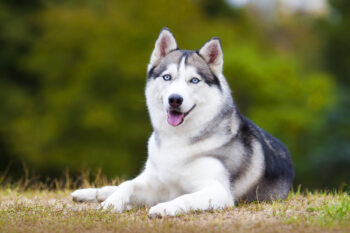Dogs have been our companions for thousands of years, not only sharing our homes but also our emotions and, intriguingly, our love for music. Some dog breeds are more vocal than others, expressing themselves through barks, yips, and, most melodically, howls. A few breeds are particularly known for their tendency to join in with music, howling along to your favorite songs in a display that’s both amusing and heartwarming. This musical inclination is not just about noise; it’s a form of communication and bonding, showcasing their social nature and sensitivity to sound. Here are the 5 dog breeds most likely to serenade you with howls during your music sessions.
1. Siberian Husky
Siberian Huskies are not just known for their stunning blue eyes and endurance but also for their vocalizations, including a propensity to howl. This behavior harks back to their ancestry of pack living, where howling served as a vital form of communication. Huskies often howl in response to high-pitched sounds or music, possibly because it mimics the frequency of howling they would use to communicate with their pack. Their howls can be long, drawn-out, and quite musical, making them likely candidates to join in during a song, especially if they feel the music calls for a duet.
2. Beagle
Beagles, with their keen sense of hearing and strong vocal cords, are another breed that loves to express themselves through howling. Originally bred as hunting dogs, beagles would howl to alert their human companions of their whereabouts and the presence of prey. Today, this translates into howling along with music, as they may interpret the sounds as a call to action or a form of pack bonding. Beagles can produce a range of vocalizations, from barks to howls, making them versatile singers ready to accompany your playlist.
3. Alaskan Malamute
Alaskan Malamutes, much like their Husky cousins, have a rich history that includes howling as a key form of communication. These powerful and resilient dogs were bred for hauling heavy freight as sled dogs and used howling to communicate over long distances. Malamutes have a deep, resonant howl that they readily use in response to music or as a way to join in on any communal activity. Their howls are expressive and can add a robust backing track to your favorite tunes.
4. Dachshund
Dachshunds might be small, but they have a mighty howl that can surprise those unfamiliar with the breed. Originally bred to hunt badgers, their loud howl was used to alert hunters to their location underground. Today, this translates to a penchant for vocalizing along with music, perhaps as a form of participation or alert. Dachshunds have a unique howl, more akin to a musical instrument than a canine cry, making them enthusiastic participants in your home concerts.
5. Coonhound
Coonhounds, known for their tracking ability and stamina, are also famous for their distinctive howl, or “baying.” This was historically used to communicate with hunters during a chase, signaling that they were on the scent of their quarry. Coonhounds are highly vocal and may howl along with music as a form of expression or to signal their participation in what they perceive as a pack activity. Their howling can be soulful and melodious, perfectly complementing a wide range of music genres.
In conclusion, while many dogs might bark or react to music, the breeds listed above are particularly known for their inclination to howl along, adding their own unique vocals to your favorite songs. This behavior is rooted in their history, genetics, and social nature, serving as a reminder of their deep bond with humans and their communicative abilities. Whether it’s the soulful howl of a Coonhound or the harmonious accompaniment of a Siberian Husky, having a dog that sings along with you can enrich your musical experience and strengthen your connection with your furry friend. It’s a delightful expression of their personality and a charming quirk that endears them even more to their human companions.
The post 5 Dog Breeds Most Likely to Howl Along to Your Favorite Songs appeared first on iHeartDogs.com.

